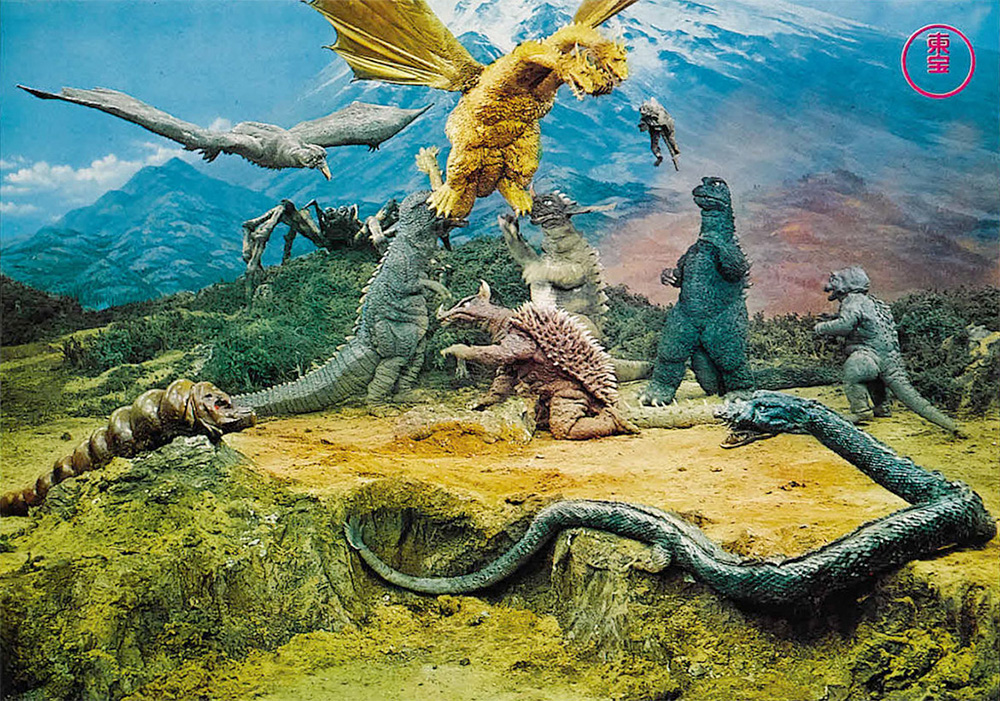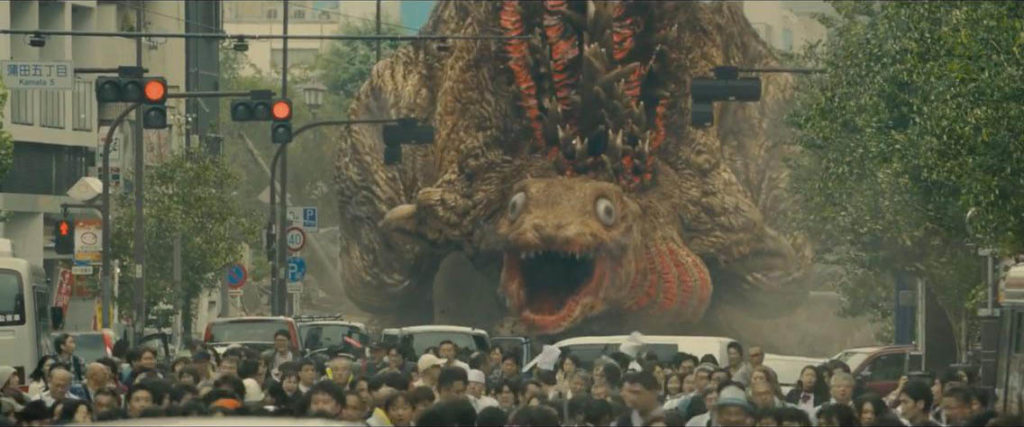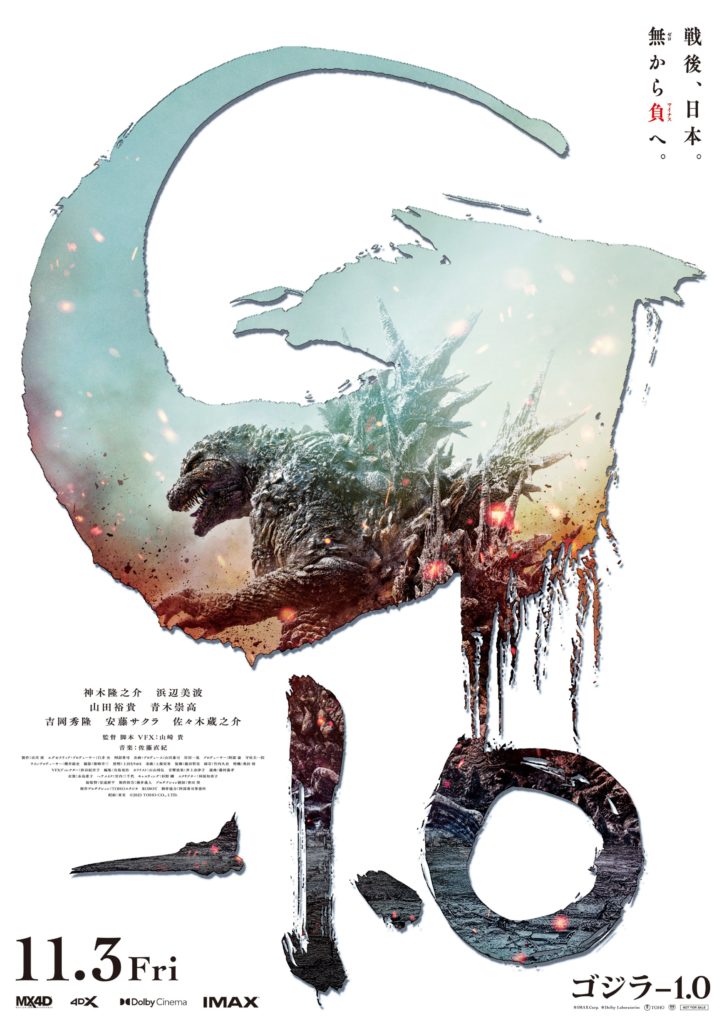A little disclaimer: If you haven’t seen the new Godzilla movie yet and are really invested in it being new to you, you probably shouldn’t read this.
During the height of the first wave of the COVID-19 pandemic, my wife and I set out to watch all of the Godzilla films released, in order. I had watched the original and the 2014 American version1Which I have an unreasonable affection for, despite the black hole that is Aaron Taylor Johnson’s performance. but had never done a proper viewing of the franchise. Thanks to Criterion’s excellently curated and designed (if poorly executed in packaging)2I have a whole rant about this, trust me. Showa Era box set, we were able to dive in.
We fell in love. We blazed through the movies and found something to enjoy in each and every one, even as Godzilla swiftly transformed from atomic horror made flesh to lovable protagonist who has friends that he hangs out with in order to kick the shit out of King Ghidorah.

We then watched the Heisei series and while there’s a lot to like there (especially in the first two entries, Return of Godzilla and Godzilla vs Biollante and the finale Godzilla Against Destroyah), it’s obvious in retrospect just how toyetic the franchise was becoming. Every film introduced a new human-piloted doodad that Bandai could shrink and sell for the kids alongside the reworked classic and new kaiju that joined the series.
Speaking of toys, how about that first American attempt at Godzilla?
Anyway.
Toho’s Millennium Era tries some of the same stuff as the Heisei movies while keeping all but two films3Godzilla Against Mechagodzilla and Godzilla: Tokyo SOS fairly discrete. The only truly outstanding movie in this period was Godzilla, Mothra and King Ghidorah: Giant Monsters All-Out Attack, which was the kind of big swing that is still shocking, a movie that combines Godzilla’s horror roots — our protagonist is seeking revenge on Japan for all the souls lost during the Pacific War — with over-the-top kaiju action. Gamera reboot helmer Shusuke Kaneko precedes the later Shin Godzilla and the movie in the this post’s title (which I’ll get to, I swear) by making a movie where you genuinely don’t know what’s going to happen in the final act.
After the (I’ll say it: awful) Godzilla Final Wars wrapped things up in 2004, it got quiet for the big G, and understandably so. The series was suffering through diminishing returns (both fiscally and creatively) and the Americans were starting to sniff around again. Since it’s 2023 and we’ve got a TV show set in that world on Apple TV+ right now along with a new Kong team-up movie (the fifth in the Monsterverse) coming next year, you can see just how badly that went for everyone involved.
Refreshed from its decade away from the property (and inspired by the success Legendary had seen with their take on the character), Toho returned to kaiju filmmaking with guns blazing. Hideaki Anno’s Shin Godzilla is a fan favorite and a great film on its own, a propulsive, dryly funny disaster movie that’s a direct response to the government’s inaction during the Fukushima crisis. Aside from the story offering a thoroughly modern take on Godzilla, I just plain appreciate that Anno was willing to get pretty fucking weird with it. I mean, look at this guy.

It was a movie that placed people at the center, something the Toho version of the franchise had tried and failed to do a few times before, with even the better movies in the series not quite equalling the very first film’s excellent cast and (dare I say) adult storytelling. There’s political jockeying, discussions of supply chain shortages,4Really eerie watching this in the 2020s, I tell you what., and arguments about when and how to respond to the creature. With Eyes East has a great breakdown on the politics of the movie, if you’re the kind of nerd that wants to read 5000 words on that kind of thing. (I am.)
And now, finally, after all this longwinded preamble, we’re at the latest film in the franchise, a complete ground-up reboot set in post-war Japan, with all that entails. While Shin Godzilla concerned itself with the governmental response to an attack by a giant radioactive dinosaur that keeps doing weird shit, Godzilla Minus One focuses on one man, Koichi Shikishima, played by Ryunosuke Kamiki. After a terrifying encounter with the nascent version of Godzilla on Odo Island5A call back to the original 1954 film near the end of the war, he finds himself lost in war-ravaged Tokyo, one of thousands of Japanese men who came back to nothing.

As the film progresses, director Takashi Yamazaki adroitly shows Shikishima building his new life. For someone primarily known for their science fiction work, it’s obvious that Yamazaki understands just how good drama works. Through a few scenes and one montage, you become fully invested in our protagonist’s journey as a person dealing with PTSD as he supports a found family. Through this straightforward framework, the director elegantly builds a parallel with Shikishima’s rebirth and Japan’s recovery as a whole.
And that’s what makes the now giant-sized and radioactive Godzilla’s return for the second act that much more horrifying. It’s absolutely brutal, and while there are elements that owe something to earlier films in the franchise, it frequently feels like the first time you’re seeing events like this thanks to the intimate visual storytelling — our cast’s faces do a lot of work — and visual effects that aren’t just “realistic,” they’re impactful.6Others have made some hay of just how low this movie’s budget was, but I think that it and The Creator show just how much intent matters when doing your pixel orgies.
In other words, they made Godzilla terrifying again, and that’s exactly what the character needed.
I won’t bother recounting the plot here — that’s what YouTube videos that explain the endings of movies do — but it’s fascinating just how much story there is in this flick: outside of Shikishima’s arc, you witness other men confronting their demons and learning to overcome them as regular citizens step up where the government fails. Hell, there’s even a “kid, you’re not ready for this,” scene that pays off so well I was actually angry at the movie.
What I’m saying is that Godzilla Minus Zero is really fucking good. It’s a reminder that franchise filmmaking can be about something. It can even be about several things!7I’m not going to use this space to go off on how thoroughly Marvel lost me when it became clear that all their movies were just going to be about Marvel Stuff, but boy did they lose me.
Leave a Reply